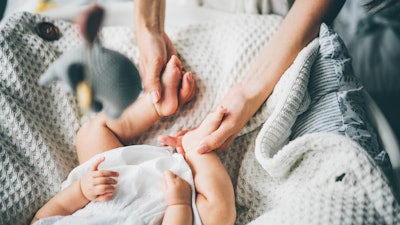
Last month, President Biden signed the Safe Sleep for Babies Act of 2021. Leading up to the law, the U.S. Consumer Product Safety Commission officials report they've recorded at least 83 crib bumper-related deaths, and another 97 connected to inclined sleepers. Now the manufacture and sale of the offending products and other similar infant products have been banned under federal law.
How the New Law Protects Babies
While it might seem counterintuitive, padded sleep products can pose real risks to babies that roll over or to the side and suffocate on the soft surface. The Safe Sleep for Babies Act bans inclined sleepers greater than 10 degrees that are marketed as sleeping surfaces for children under the age of one.
The legislation also takes aim at products that fit along the sides of cribs or between slats. Vinyl bumper guards, padded crib bumpers, and crib slat covers can all lead to tragic accidents.
The law is in accordance with recommendations from the American Academy of Pediatrics. They advise parents to put babies to sleep alone, on their backs, on flat, firm surfaces.
A History of Lawsuits, Recalls
The new legislation comes on the heels of years of product recalls and news headlines about devastating accidents. In 2014, an Atlanta couple awoke to find their seven-week-old's head flopped forward and to his side while in the Fisher-Price Rock 'n Play Sleeper.
The baby stopped breathing and had started to turn blue. Quick action saved the child's life; the baby's grandmother grabbed the boy, smacking his diaper, causing him to gasp for air. After a short stay in the hospital, the baby made a full recovery.
The family called Fisher-Price to alert them of the dangers associated with their product. The company stood by its product and made no effort to investigate the issue. The family filed a lawsuit, hoping legal action might spur the corporation to take action and prevent similar accidents from happening in the future.
During a 2018 deposition, a Fisher-Price employee said that since the company had introduced the Rock 'n Play Sleeper a decade before, at least 14 infant deaths were tied to the sleeper.
It took another year for Fisher-Price to recall all 4.7 million Rock 'n Play Sleepers officially. Other companies pulled similar products from shelves. The Rock 'n Play Sleeper and similar infant-inclined sleepers were linked to at least 73 deaths and more than 1,000 incidents.
A Fatal Design
The inclined infant sleeper was designed with exhausted parents in mind. The original creator of the Rock 'n Play Sleeper relied on a pediatrician's advice to elevate her baby's head when her son was suffering from reflux. Linda Chapman looked for an inclined sleeper on the market but came up empty-handed. This spurred her to create a product for Fisher-Price - despite having a background in toy design, not sleep devices.
The pediatrician's advice motivated the design process. Unfortunately, that advice directly opposed what the American Academy of Pediatrics recommended. As stated, since 1994, the group has advised parents to put babies to sleep on their backs on flat surfaces, free from the bedding.
The Rock 'n Play Sleeper uses sidewalls and head support made of soft bedding and features a restraint harness. However, pediatric gastroenterologists have also known since the 1990s that placing babies on an incline does not ease their reflux. In fact, sleeping on an incline may exacerbate the issue.
The design, from the start, was created without any kind of pediatrician input. Chapman never confirmed whether the Rock ‘n Play Sleeper met modern medical advice. She was asked during a deposition, "Do you ever research any of the medical or regulatory conditions of the product?" The answer?
"I do not. There's a team of people at Fisher-Price, and that's their responsibility."
The Importance of Safety Testing
After the Rock ‘n Play recall was announced, the Consumer Product Safety Commission released findings of a new study on inclined infant sleepers. The results? "None of the inclined sleep products that were tested and evaluated as part of this study are safe for infant sleep," said Erin Mannen, Ph.D., an expert in biomechanics and a professor at the University of Arkansas for Medical Sciences.
The study found that babies in inclined sleepers tend to roll over because they wind up in a scrunched-up position. Similar to the fetal position, this allows babies to roll over earlier than they would be able to on a flat surface. Other design factors posed additional risks, including the lack of breathability in the sleeper's sidewalls. Had this safety testing been conducted before the Rock ‘n Play was designed, many young infants may be alive today.
A New Era for Infant Sleep Products
The Safe Sleep for Babies Act aims to reign in negligent product designs and help keep society's tiniest members safer each night. The legislation is a step in the right direction. For many families, though, the announcement of the safety standards comes too late. While future generations of babies may be safer, there are dozens of families still grieving the untimely loss of their infants. We can only hope they receive justice for their losses, and the government holds negligent product manufacturers liable for the damages done.






















